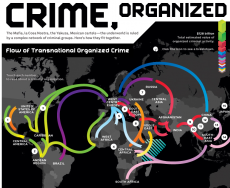
Organised Crime is a big problem in many countries of the world, if not all of them, and in other articles I’ve looked at the specific structures of organised crime in both the USA and the UK, but in recent years, the problem of Organised Crime may have become more powerful. With the increasing globalisation of business, Organised Crime too has moved onto an international playing field, multiplying the problems that face each individual country.
It should be noted of course than Organised Crime on an international level is not a new thing. One only has to watch ‘Pirates of the Caribbean’ to know that fraud, smuggling and other types of piracy have been going on for centuries. In many ways, the pirates seen in films like that were the earliest form of international organised criminals. However, this international Organised Crime has changed shape somewhat in recent years and is stronger now than ever before.
International crime today is thought to include 3 main types of activity. The first is smuggling, which involves the movement of illegal goods in and out of countries without the knowledge of authorities, such as guns, endangered species or drugs. The second type involves contraband items, such as alcohol or cigarettes. These items are taxed on entrance to the UK, and there are limits to how much can be moved between countries. Because of this, some people attempt to move them in without the knowledge of the authorities. The third type of International Organised Crime is based around providing illegal services. A good example of this is money laundering, whereby money can be moved overseas illegally to protect it from being seized by authorities. Another example is the movement of immigrants for slave labour, known as human trafficking.
Two of the worst affected areas of crime by the move to an international level are drug markets, human trafficking and smuggling. The authorities have made many attempts to protect against these crimes, but these have had limited success. Some theorists argue that while there is a market for these types of organised crimes, they can never be completely stopped, since the potential earnings that can be made from selling these goods are so high people will always find a way to get around our defences. The approach of many politicians to wage war on drugs appears to have had to opposite effect. In reality, rather than making people scared to commit this sort of crime, it has made it more attractive, since with each new defence in place, the amount criminals can earn for their crime increases. Equally, there is a political and economic reason for the exporting of some of these goods, since it makes good business sense to export those goods which your country has most readily available, and for some countries, drugs are the easiest crop to grow and sell, so there is a natural tendency towards exporting these items, even if illegally.
Having discussed the move to international level Organised Crime, it should not be forgotten that globalisation worked both ways. Just as it has allowed Organised Crime to grow and thrive, it has also allowed improved policing and control of Organised Crime through better communication between nations and sharing of ideas, for example, many other nations followed suit after Peel first conceived the Police service in Britain and Ireland. Equally, improvements in technology and other changes around the world will always have both positive and negative effects in the control of Organised Crime. The best we can do is to be aware of these changes so that we can get ahead of the criminals.
Image from: http://geometrx.com/wp-content/uploads/2011/02/Organized-Crime-Map.png

0 Comment:
Be the first one to comment on this article.